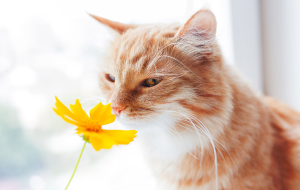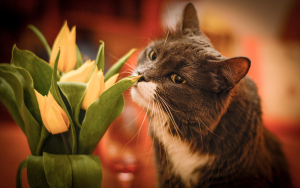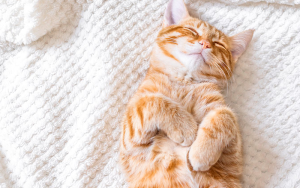What Essential Oils Are Safe for Cats? A Comprehensive Guide

Introduction
Essential oils have become popular for their various uses in aromatherapy, cleaning, and natural remedies. However, when it comes to our feline friends, caution is of utmost importance. Cats have a unique and sensitive physiology, and many essential oils
can be toxic to them. Understanding which essential oils are safe for cats is crucial for keeping our furry companions healthy and happy.
The Sensitive Feline Physiology
The Liver’s Role
Cats have a liver that metabolizes substances differently than humans and dogs. Their liver lacks a certain enzyme, glucuronyl transferase, which is essential for efficiently breaking down many compounds found in essential oils. As a result, substances
that might be relatively harmless to other animals can build up in a cat’s system and cause toxicity.
The Respiratory System
Cats also have a more sensitive respiratory system. Their lungs are smaller in proportion to their body size, and they have a higher respiratory rate. Inhaling strong scents from essential oils can irritate their delicate airways and lead to problems
such as coughing, sneezing, or even more severe respiratory distress.
Safe Essential Oils for Cats
Lavender Oil (in Limited Quantities)
- Benefits: Lavender oil is known for its calming properties. In small, carefully measured amounts, it can have a mild relaxing effect on cats. For example,
a very diluted lavender spray (with a maximum dilution of 0.1% – 0.25%) can be used to freshen up a cat’s bedding area. The gentle scent might help soothe a slightly anxious cat.
- Precautions: Even though lavender oil can be beneficial in moderation, it’s essential to use it sparingly. Higher concentrations can cause skin irritation,
vomiting, or lethargy in cats. It’s also crucial to ensure that the cat doesn’t ingest the oil, as ingestion can lead to more severe health problems.
Chamomile Oil
- Benefits: Chamomile oil has anti – inflammatory and mild sedative properties. A highly diluted form of chamomile oil (about 0.05% – 0.1%) can be used to
create a gentle mist that may help a cat feel more at ease. It can also be beneficial for minor skin irritations when applied in an extremely diluted form topically. For instance, if a cat has a small itchy patch on its skin, a carefully prepared
chamomile oil solution might provide some relief.
- Precautions: As with all oils, it’s important to monitor the cat for any signs of discomfort or adverse reactions. Cats should not be allowed to lick or
ingest the chamomile oil, as it can cause stomach upset or other health issues.
Copaiba Oil
- Benefits: Copaiba oil is generally considered to be one of the safer essential oils for cats. It has anti – inflammatory properties and can be used in very
small amounts for pain relief. For example, in cases where a cat has a minor joint pain or a small injury, a highly diluted Copaiba oil blend (around 0.05% – 0.1%) might offer some relief when applied topically.
- Precautions: The key with Copaiba oil is to use it in extremely small quantities. Overuse or improper dilution can lead to potential toxicity. Also, always
make sure the cat doesn’t ingest the oil, as it can cause harm to their internal organs.
How to Use Safe Essential Oils Around Cats
Dilution is Key
- Always dilute essential oils to an extremely low concentration before using them around cats. A general rule of thumb is to use a dilution rate that is much lower than what is typically recommended for humans. For example, if a human – friendly essential
oil blend might call for a 1% – 2% dilution, for cats, it should be no more than 0.1% – 0.25% depending on the oil.
- Use a carrier oil such as fractionated coconut oil or sweet almond oil to dilute the essential oil. This helps spread the oil evenly and reduces the risk of concentrated exposure.
Avoid Direct Application and Ingestion
- Never apply essential oils directly to a cat’s skin or fur. Instead, apply the diluted oil to a cloth or a diffuser pad and place it in an area where the cat can choose to be near it or avoid it. This gives the cat control over its exposure to the
scent.
- Ensure that cats cannot ingest the essential oil. Keep all essential oils and any products containing them out of the reach of cats. If a cat ingests an essential oil, it’s important to contact a veterinarian immediately.
Monitor for Reactions
- After introducing a new essential oil or a product containing it in a cat – friendly way, closely monitor the cat for any signs of an adverse reaction. These signs can include excessive licking, sneezing, coughing, vomiting, diarrhea, lethargy, or
changes in behavior such as increased aggression or hiding. If any of these symptoms occur, discontinue use and consult a veterinarian.
Essential Oils to Avoid at All Costs
Tea Tree Oil
- Tea tree oil is highly toxic to cats. Even a small amount can cause serious health problems such as neurological disorders, muscle weakness, tremors, and even death. The toxic components in tea tree oil can be absorbed through the skin or ingested,
so it’s crucial to keep it away from cats completely.
Peppermint Oil
- While peppermint oil is a popular choice for humans for its refreshing scent and various uses, it’s not safe for cats. Ingestion or skin contact can lead to vomiting, diarrhea, and respiratory problems. The strong scent can also be overwhelming for
a cat’s sensitive respiratory system.
Eucalyptus Oil
- Eucalyptus oil is another essential oil that should be avoided around cats. It contains compounds that can be toxic to cats, especially if inhaled or ingested. The oil can cause respiratory distress, lethargy, and other health issues.
Conclusion
When it comes to using essential oils around cats, safety must always come first. While a few essential oils can be used in highly diluted and carefully monitored situations, many are simply too dangerous for our feline friends. By understanding which
oils are safe and how to use them properly, we can create a more pleasant environment for our cats without putting their health at risk. If you’re ever in doubt about the safety of an essential oil for your cat, it’s always best to consult a veterinarian.







